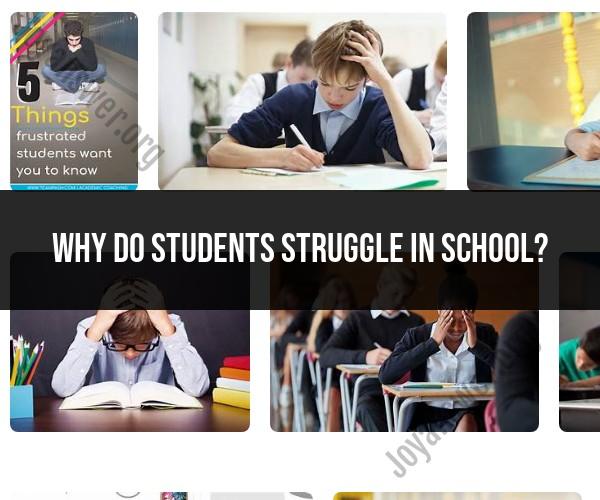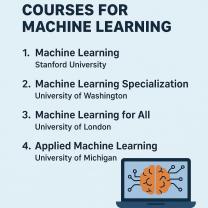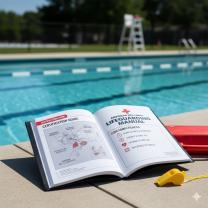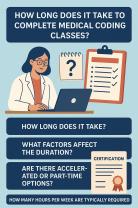Why do students struggle in school?
Students may struggle in school for a variety of reasons, and it's essential to recognize that each student is unique, so their challenges may stem from a combination of factors. Some common reasons why students may struggle in school include:
Learning Disabilities: Students with learning disabilities, such as dyslexia, ADHD, or autism spectrum disorders, may face difficulties in processing information, staying focused, or understanding certain concepts.
Lack of Motivation: A lack of interest or motivation in academics can lead to poor performance. This can be influenced by factors like uninspiring teaching methods, a disconnected curriculum, or personal disengagement.
Inadequate Study Skills: Some students may struggle due to poor study habits, time management skills, or organizational abilities. These skills are crucial for academic success, and without them, students may find it challenging to keep up with coursework and assignments.
Mental Health Issues: Anxiety, depression, and other mental health issues can significantly impact a student's ability to concentrate, attend classes regularly, and complete assignments on time.
Family Issues: Family problems, such as divorce, financial instability, or a lack of support at home, can create stress and distractions that hinder a student's academic performance.
Bullying and Peer Pressure: Being a victim of bullying or succumbing to negative peer pressure can affect a student's self-esteem and emotional well-being, which can, in turn, impact their academic performance.
Language Barriers: Students who are non-native speakers or have limited proficiency in the language of instruction may struggle to comprehend lessons and complete assignments.
Lack of Access to Resources: Insufficient access to educational resources, such as textbooks, technology, or a quiet place to study, can hinder a student's ability to excel academically.
Special Education Needs: Some students require special education services and individualized support to address specific learning or behavioral challenges.
Health Issues: Chronic illnesses or physical health problems can result in frequent absences from school, making it difficult for students to keep up with coursework.
Socioeconomic Factors: Poverty and socioeconomic disparities can impact a student's access to quality education, nutritious meals, and a stable living environment, all of which can affect their school performance.
Teacher-Student Relationships: A negative or unsupportive relationship with a teacher can demotivate students and hinder their willingness to engage in the learning process.
High Academic Pressure: Excessive academic pressure from parents or a highly competitive school environment can lead to stress and anxiety, which may impede a student's ability to perform well.
It's essential for educators, parents, and support systems to identify the specific reasons for a student's struggles and provide appropriate interventions, accommodations, and support to help them overcome these challenges and succeed in school. Recognizing and addressing these issues early can make a significant difference in a student's academic journey.
Examining the Factors Behind Student Struggles in School.
There are many factors that can contribute to student struggles in school. Some of the most common factors include:
- Academic factors: These include learning disabilities, difficulty with specific subjects, and poor study habits.
- Personal factors: These include mental health issues, such as anxiety and depression, as well as physical health problems, such as chronic pain and fatigue.
- Social factors: These include bullying, social isolation, and family problems.
- Environmental factors: These include poverty, homelessness, and lack of access to resources.
It is important to note that these factors often overlap and interact with each other. For example, a student with a learning disability may also experience anxiety and depression, which can make it even more difficult for them to succeed in school.
Understanding the Challenges Students Encounter in Their Education.
The challenges that students encounter in their education can vary depending on their individual circumstances. However, some common challenges include:
- Meeting academic expectations: Students may feel pressure to perform well in school in order to meet the expectations of their parents, teachers, and peers. This pressure can lead to anxiety and stress, which can make it difficult for students to learn.
- Keeping up with the curriculum: Students may have difficulty keeping up with the pace of the curriculum, especially if they are struggling with a particular subject. This can lead to frustration and discouragement.
- Making friends and fitting in: Students may feel pressure to fit in with their peers and make friends. This can be especially difficult for students who are different from their peers in some way, such as students with disabilities or students from different cultural backgrounds.
Addressing Student Difficulties in the Learning Environment.
There are a number of things that can be done to address student difficulties in the learning environment. Some of these include:
- Differentiating instruction: Teachers can differentiate instruction to meet the needs of all learners. This means providing different levels of support and challenge to different students.
- Providing extra help: Teachers can provide extra help to students who are struggling. This may include tutoring, small group instruction, or individualized learning plans.
- Creating a supportive classroom environment: Teachers can create a supportive classroom environment where all students feel valued and respected. This includes fostering positive relationships between students and teachers, as well as creating a classroom culture where students feel comfortable asking for help.
- Collaborating with parents and other professionals: Teachers can collaborate with parents and other professionals, such as school counselors and social workers, to support students who are struggling. This collaboration can help to identify and address the underlying causes of student difficulties.
It is important to note that there is no one-size-fits-all solution to addressing student difficulties in the learning environment. The best approach will vary depending on the individual needs of the student.












